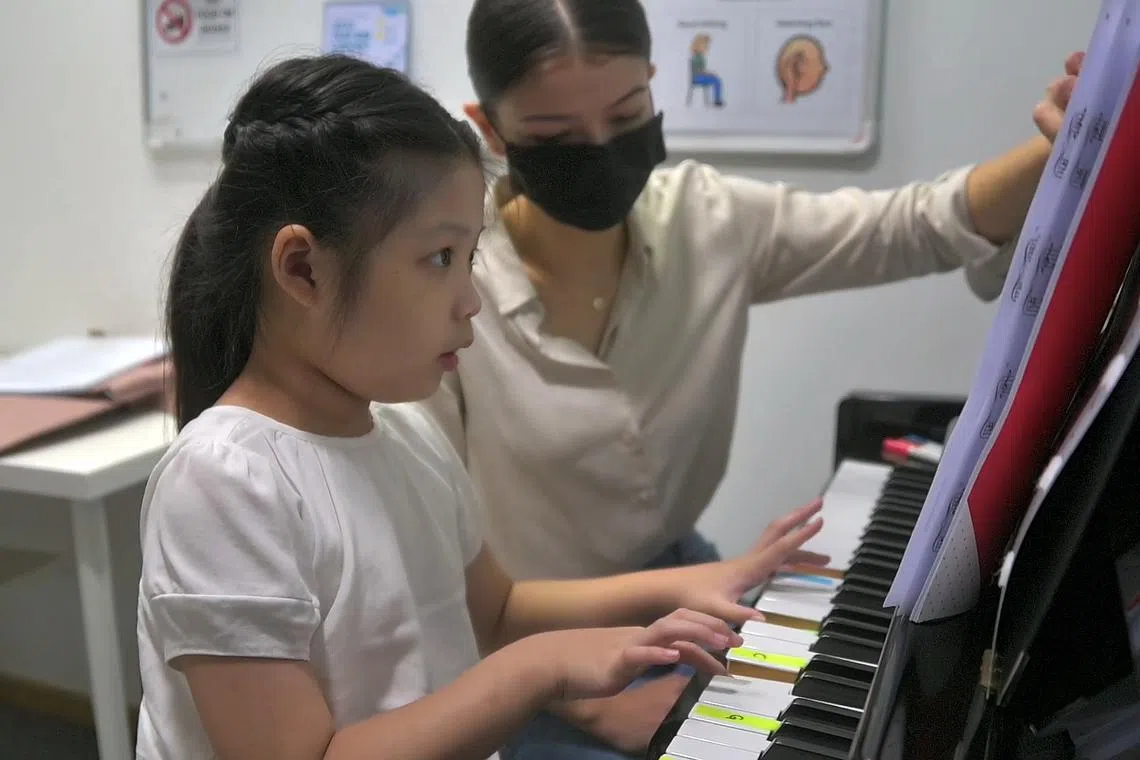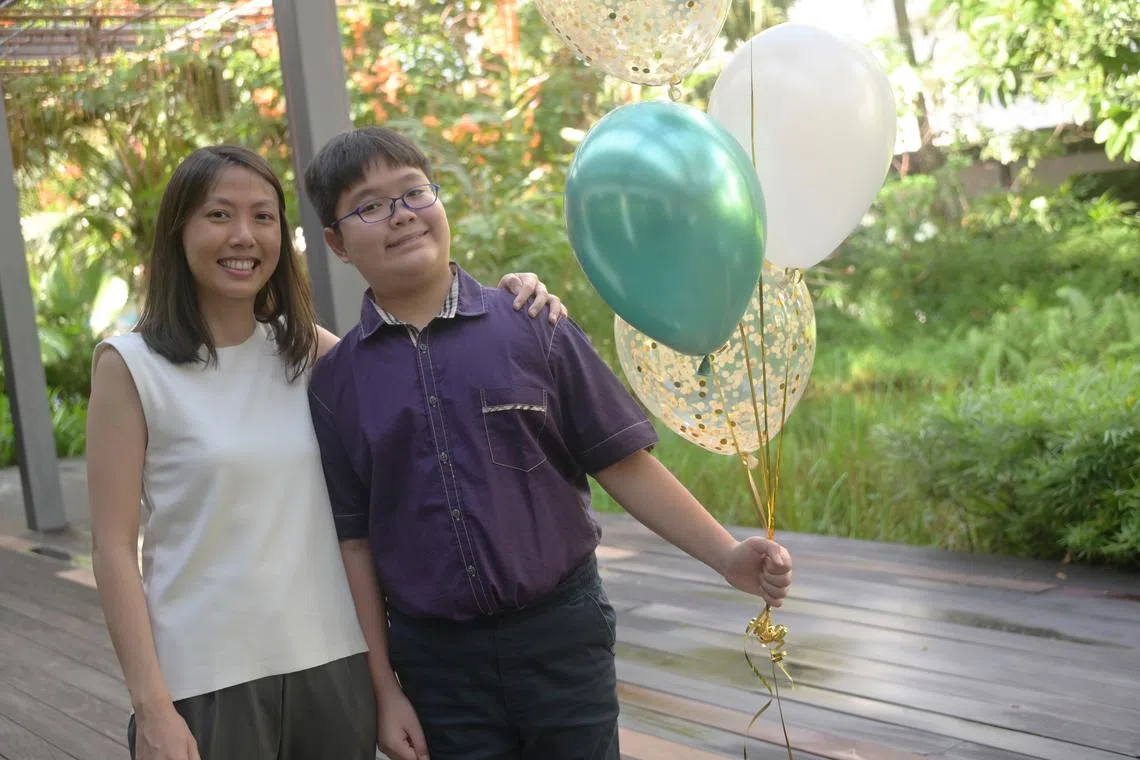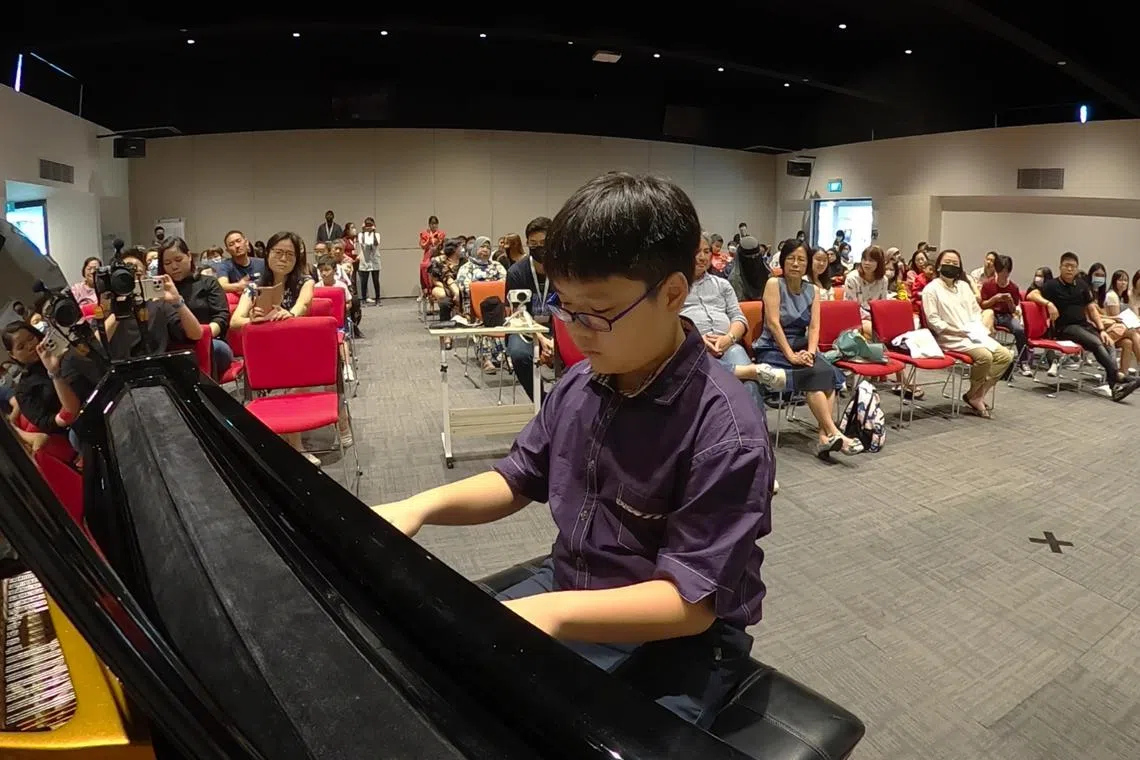Learning music helps those with special needs hone their daily skills
Sign up now: Get ST's newsletters delivered to your inbox
Music can be a powerful tool in helping children with autism. Piano lessons have helped seven-year-old Claire, who is non-verbal, improve her motor skills, attention span and confidence.
SINGAPORE - To keep Claire engaged during piano lessons, teacher Georgina Johanna Scott fashions customised visual cues based on Claire’s favourite thing – air-conditioning company Daikin’s blue raindrop mascot.
Using magnets with the raindrop mascot to track lesson tasks helps her young pupil pay attention during class.
Seven-year-old Claire Lim, who has autism and is non-verbal, struggles to sit at the instrument for long periods of time.
Her mother Esther Wang, 39, credits music lessons at The Radiant Spectrum, where Ms Scott is among 10 teachers trained in special education, with helping to improve Claire’s attention span – not just for piano lessons but also in school. In addition, learning to play the piano has boosted her motor skills and confidence.
Claire began music classes in May 2021, after Ms Wang chanced upon the school, which bills itself as Singapore’s first music school specifically for those with special needs.

Seven-year-old Claire and her teacher Georgina Johanna Scott.
ST PHOTO: ASHLEIGH SIM
The Radiant Spectrum was set up in 2018 by Ms Samantha Soh-Tann, who had been teaching music for some time when she encountered in 2017 her first pupil with special needs, a boy who has autism and is non-verbal.
Word spread, and she eventually had 16 pupils who needed special education.
“I realised that there are a lot of them with a very natural keenness for music,” she said. “If I were to start a school, if I could build a team of like-minded teachers, we could help so many more people.”
There are now more than 100 students, aged between three and 20, at the school. Their needs range from autism and attention deficit hyperactivity disorder to cerebral palsy and motor and speech delay. Lessons cost $90 for a 45-minute session.
On Dec 9, Ms Soh-Tann organised a showcase concert by her students at the Enabling Village in Lengkok Bahru.
“We wanted to celebrate everyone’s achievements, big or small, because it’s about the journey, it’s not about comparing the end point,” she said.
Among those who performed was 11-year-old Andrew Eng. The Primary 5 pupil at Pathlight School has been taking piano lessons since August 2020.
His mother, 40, who asked to be identified only as Mrs Eng, plays the piano herself and had tried to interest Andrew in it, but to no avail.
“He would be very resistant, he would get angry. But he had a good sense of rhythm and very good aural sense and pitch sense,” she said.
She eventually convinced him to attend a trial lesson with Ms Soh-Tann where, in 30 minutes, he was able to play a simple melody. He was hooked.

Ms Samantha Soh-Tann and her student Andrew Eng.
ST PHOTO: ASHLEIGH SIM
Now, Andrew enjoys spending his time playing his favourite tunes. He said: “Playing the piano makes me feel happy most of the time because I like the songs I learn.”
The lessons have improved his fine motor skills – for instance, he used to struggle to make the peace sign with his fingers, but can now do so. Mrs Eng has also noticed that he has become more expressive and understanding of emotions through learning how music conveys different moods through sounds and rhythm.
The lessons have also added a different dimension to the mother-son relationship, she said.
Said Mrs Eng: “I also get to perform with him and play duets with him, and that’s something that’s very, very special to me, to be able to do that with my son.”

Andrew Eng playing advanced tunes like the Canon In D and River Flows In You at the showcase concert organised by The Radiant Spectrum.
ST PHOTO: ASHLEIGH SIM
Ms Christine Kwek, a clinical psychologist from Annabelle Kids, said that learning music can bring various benefits to children with special needs such as autism. She also uses music in her therapy practice.
She said: “Music stimulates a specialised group of neurons in our brain which help us to communicate. This is what we need in terms of communication, to read social cues. It also allows us to build empathy and develop language.”
Ms Lynette Tan, a clinical psychologist at The Psychology Practice, said that through learning music, children with special needs can connect with their emotions and learn to regulate them through the feelings they experience along the journey such as frustration and enjoyment, or when they resonate with the music.
Children with special needs might not be able to express how they feel as easily or as readily, and learning music, with the appropriate guidance and emotional support, can help hone these skills, she added.
Other ways to expose children to music include listening to music or dancing to it, which can help with developing motor skills, or enjoying it with a group, which can help with social interaction, said Ms Tan.



